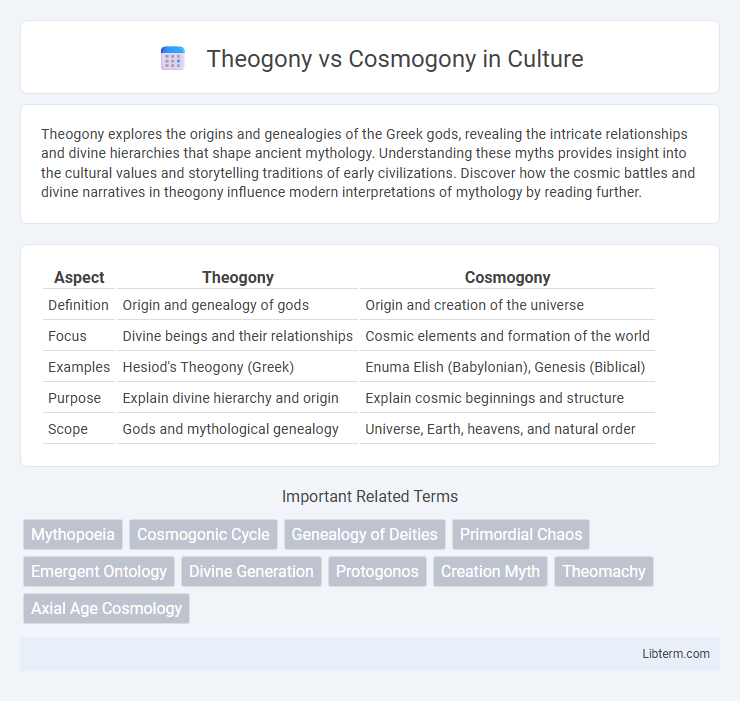Theogony explores the origins and genealogies of the Greek gods, revealing the intricate relationships and divine hierarchies that shape ancient mythology. Understanding these myths provides insight into the cultural values and storytelling traditions of early civilizations. Discover how the cosmic battles and divine narratives in theogony influence modern interpretations of mythology by reading further.
Table of Comparison
| Aspect | Theogony | Cosmogony |
|---|---|---|
| Definition | Origin and genealogy of gods | Origin and creation of the universe |
| Focus | Divine beings and their relationships | Cosmic elements and formation of the world |
| Examples | Hesiod's Theogony (Greek) | Enuma Elish (Babylonian), Genesis (Biblical) |
| Purpose | Explain divine hierarchy and origin | Explain cosmic beginnings and structure |
| Scope | Gods and mythological genealogy | Universe, Earth, heavens, and natural order |
Introduction to Theogony and Cosmogony
Theogony explores the origins and genealogies of gods, tracing divine ancestry and mythological narratives within ancient cultures. Cosmogony examines the creation and formation of the universe, detailing cosmological myths and the primordial forces that shaped existence. Both fields provide foundational insights into mythological perspectives on origins, emphasizing different aspects of mythic structure and belief systems.
Defining Theogony: Origins of the Gods
Theogony refers to the ancient narratives detailing the origins and genealogies of gods, primarily focusing on divine births and relationships within mythologies such as Hesiod's Theogony. It emphasizes the hierarchical structure and familial connections among deities, explaining how gods came into existence and their roles in the cosmos. Unlike cosmogony, which centers on the creation of the universe, theogony specifically addresses the origin and nature of gods themselves.
Understanding Cosmogony: Origins of the Universe
Cosmogony explores the origins and development of the universe, detailing the processes and events that led to the formation of celestial bodies, galaxies, and cosmic structures. Unlike Theogony, which centers on the genealogy of gods and divine beings, cosmogony provides scientific and mythological frameworks explaining the universe's inception, such as the Big Bang theory or creation myths from various cultures. Understanding cosmogony reveals how ancient civilizations interpreted cosmic beginnings, blending metaphysical concepts with observational phenomena to explain existence.
Key Differences Between Theogony and Cosmogony
Theogony explores the origins and genealogy of gods, emphasizing divine lineage and mythological narratives, whereas cosmogony centers on the creation and structure of the universe, detailing cosmological beginnings and physical formation. Theogony typically involves stories of gods' births and relationships, such as Hesiod's account of the Greek pantheon, while cosmogony addresses the primordial chaos, cosmic elements, and formation of the world itself. Key differences include the theogony's focus on divine beings versus cosmogony's broader focus on the universe's material and metaphysical origins.
Theogony in Ancient Mythologies
Theogony in ancient mythologies primarily explores the origins and genealogies of gods, detailing the birth and relationships among deities within pantheons like those of Greek and Norse traditions. It serves as a foundational narrative explaining divine hierarchies and the cosmic order established by gods such as Zeus in Greek mythology. In contrast, cosmogony focuses on the origin of the universe itself, describing how the cosmos and the primordial elements came into existence before or alongside divine beings.
Cosmogony Across Civilizations
Cosmogony explores the origins of the universe and varies significantly across civilizations, reflecting diverse creation myths and beliefs. Ancient Egyptian cosmogony centers on the primordial waters of Nun and the emergence of the sun god Ra, while Mesopotamian traditions describe creation through divine conflict, such as in the Enuma Elish. Greek cosmogony, notably in Hesiod's Theogony, blends the generation of gods with the universe's formation, illustrating how cultural perspectives shape understanding of cosmic beginnings.
Intersections: Where Theogony and Cosmogony Meet
Theogony and cosmogony intersect in their exploration of origins, with theogony detailing the genealogy of gods and cosmogony explaining the creation of the universe. Both narratives address primordial chaos as the starting point, revealing how divine forces emerge to establish order. This intersection highlights the intertwined nature of divine birth and cosmic formation in mythological traditions.
Influential Texts: Hesiod’s Theogony vs. Other Cosmogonies
Hesiod's Theogony is a foundational ancient Greek text detailing the origins of gods and the divine genealogy, shaping Western mythological frameworks. Other cosmogonies, such as the Babylonian Enuma Elish and the Egyptian Pyramid Texts, present creation narratives emphasizing chaos, cosmic order, and divine kingship differently. These influential texts provide contrasting mythic perspectives on the universe's origin, reflecting diverse cultural understandings of creation and divine authority.
Theogony and Cosmogony in Modern Interpretations
Modern interpretations of Theogony emphasize its role in exploring divine genealogy within various mythologies, highlighting the relationships and hierarchies between gods that shape cultural beliefs about the cosmos. Cosmogony in contemporary studies focuses on the origin and structure of the universe, integrating scientific perspectives with mythological narratives to examine how ancient cultures understood creation. Both fields intersect by revealing how ancient societies constructed meaning about existence and divine order through evolving myths and cosmological theories.
Conclusion: The Significance of Creation Narratives
Creation narratives like Theogony and Cosmogony play a crucial role in shaping cultural identity and explaining the origins of the universe and divine order. Theogony, centered on the genealogy of gods, emphasizes the divine hierarchy and mythological foundations of the cosmos, while Cosmogony focuses on the physical emergence and structure of the universe itself. Understanding these narratives reveals how ancient civilizations sought to interpret existence, natural phenomena, and the relationship between humanity and the divine.
Theogony Infographic

 libterm.com
libterm.com